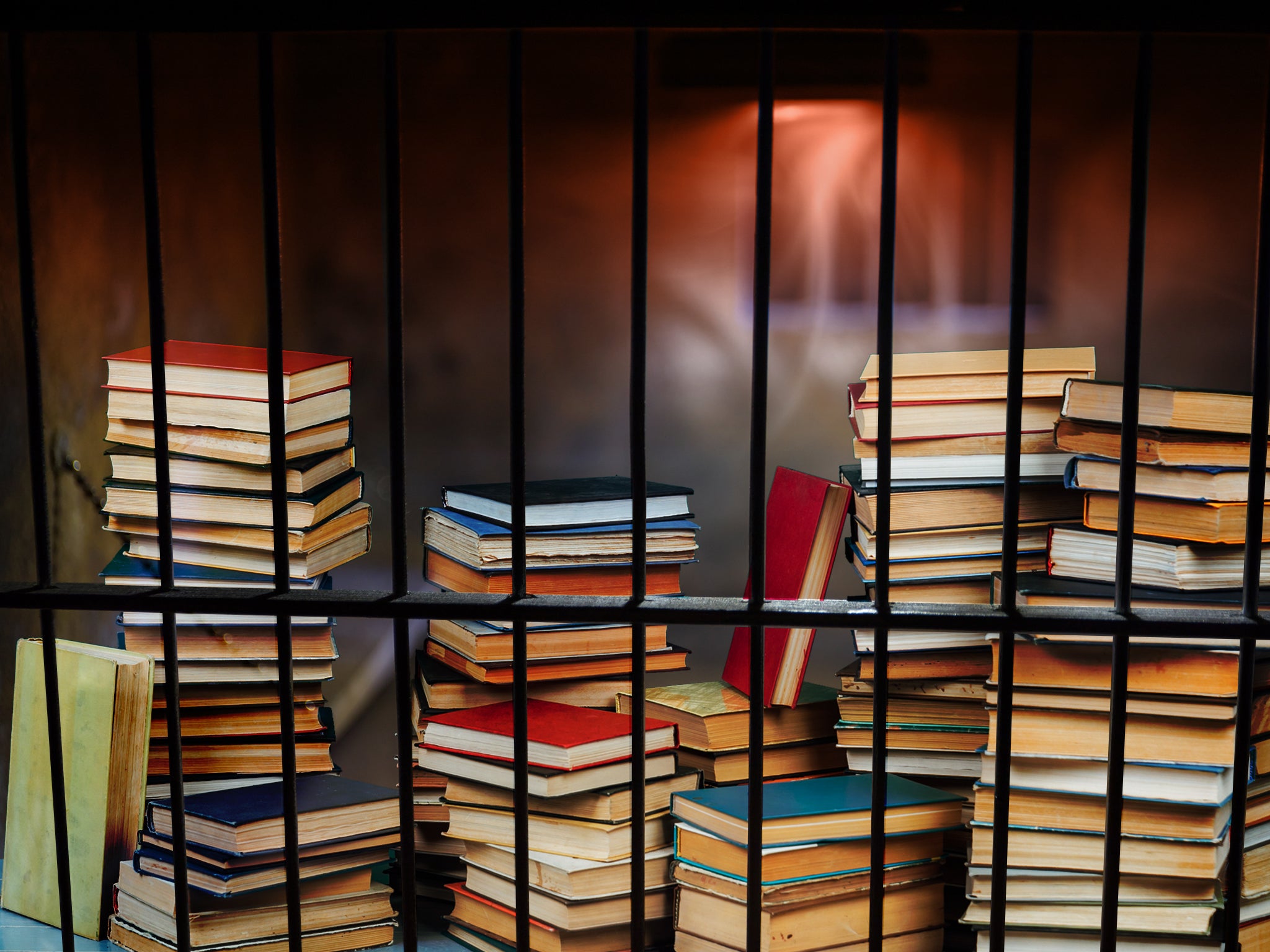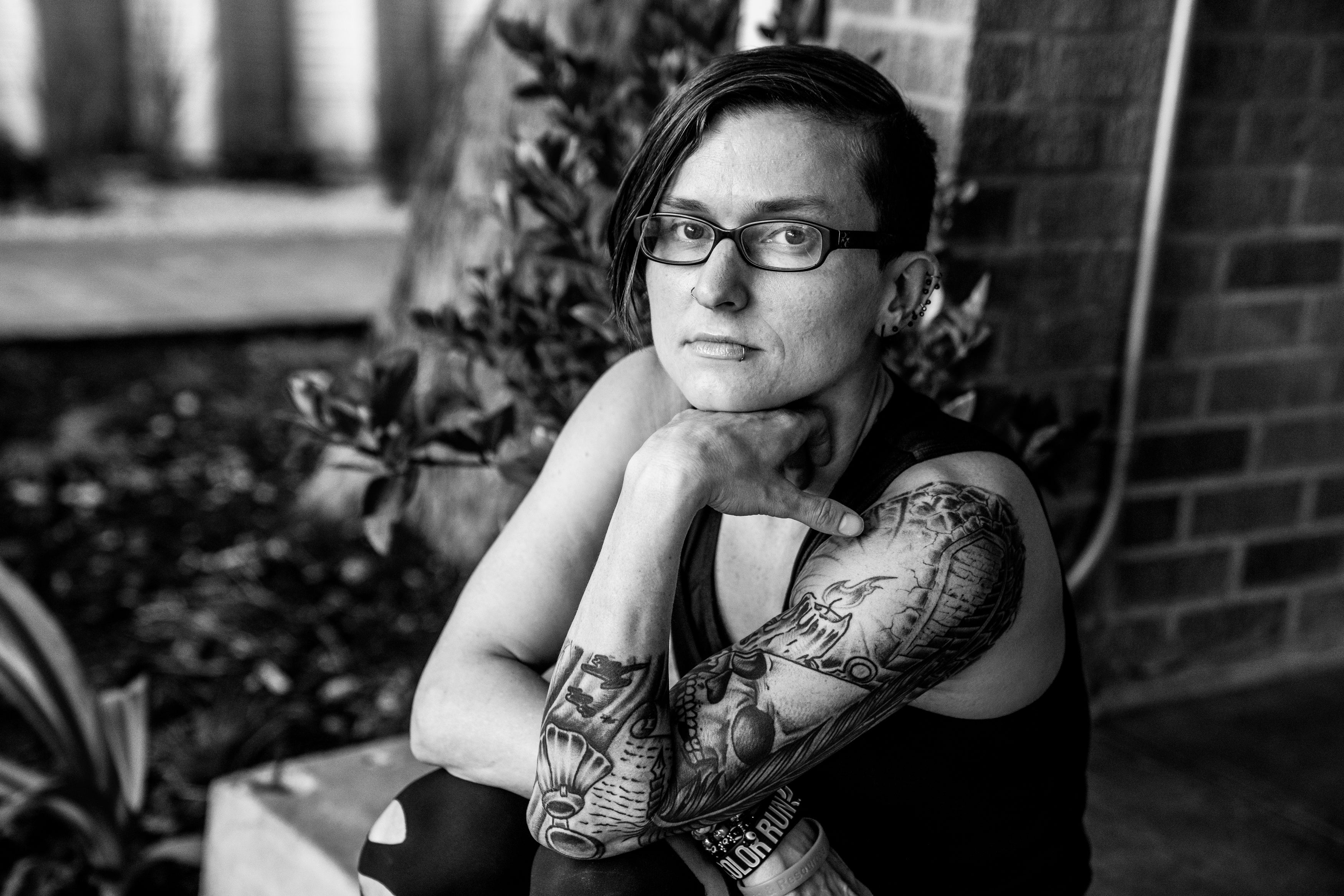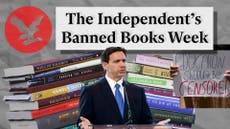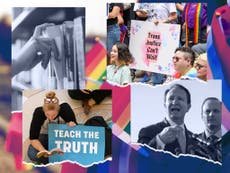America’s book bans have already come for prisons
From colouring books to abolition newspapers and Reader’s Digest magazines, thousands of titles are banned in prisons and jails across the country, often with opaque reasons and with little oversight, Alex Woodward reports


Your support helps us to tell the story
From reproductive rights to climate change to Big Tech, The Independent is on the ground when the story is developing. Whether it's investigating the financials of Elon Musk's pro-Trump PAC or producing our latest documentary, 'The A Word', which shines a light on the American women fighting for reproductive rights, we know how important it is to parse out the facts from the messaging.
At such a critical moment in US history, we need reporters on the ground. Your donation allows us to keep sending journalists to speak to both sides of the story.
The Independent is trusted by Americans across the entire political spectrum. And unlike many other quality news outlets, we choose not to lock Americans out of our reporting and analysis with paywalls. We believe quality journalism should be available to everyone, paid for by those who can afford it.
Your support makes all the difference.Jail officials in Florida, briefly, banned a book from the state’s prisons about what life is like… inside a prison.
Last year, passages from the Keri Blakinger’s Corrections In Ink: A Memoir were determined by the state’s Literature Review Committee to be “dangerously inflammatory.” The book itself was deemed a “threat to security, order or rehabilitative objectives of the correctional system or the safety of any person.”
Blakinger’s appeal appeared to make things worse. The state’s six-member review committee came up with even more reasons for banning her memoir, including depictions of “sexual conduct.”
“I had done enough reporting and records requests around bans in prisons nationally that I knew how absurd they could be. So, I’m honestly surprised there wasn’t some state that had come up with a reason to ban it sooner,” Blakinger told The Independent.
Blakinger, now a reporter for The Los Angeles Times, spearheaded a database at The Marshall Project that found at least 54,000 titles banned by corrections officials in 18 states that keep such records.
Florida topped the list.
The state bans more than 20,000 titles from its state prisons, according to reports from The Marshall Project and PEN America and a list of materials reviewed by The Independent.
Roughly 2 million people are incarcerated in more than 1,500 state prisons, 98 federal facilities, hundreds of local jails and juvenile correctional facilities, and dozens of immigration detention centres, military prisons, and other facilities across the country and US territories, according to the Prison Policy Initiative.
And within those systems, thousands of books, magazines and other publications are banned, under restrictions that vary from state to state, facility to facility, often without any clear public guidance about what is banned, and why, and how people inside those facilities can access them.
At the federal level, the Federal Bureau of Prisons states that publications can only be rejected if they are found to be “detrimental to the security, good order, or discipline of the institution or if it might facilitate criminal activity,” according to the National Institute of Corrections.
But each state adheres to its own set of policies to determine what is acceptable. Officials at multiple levels in prison systems can censor or block materials, creating a series of overlapping and sometimes conflicting bans performed by individuals, prison officials and state agencies, which makes it difficult to get a full accounting of what, exactly, is prohibited.
Those rules typically have little, if any, oversight. Many states and prisons do not provide reasons for banning books or maintain publicly accessible lists, if any, that track them. One corrections official in Alaska told The Marshall Project that the state just relies on memory.
Texas bans more than 10,000 titles. Arizona bans at least 4,600. In Michigan, more than 1,000 titles are banned, from classic thrillers to instructional books in the For Dummies lineup.
Some titles are banned in one state but allowed in another, underscoring the often arbitrary decision making behind such bans. James Baldwin’s seminal I Am Not Your Negro has been banned in Kansas (for “racism/inciting”) but allowed in California. Oregon allowed a children’s book about Indigenous art that was banned in Florida.
The long list of banned Florida titles also includes Reader’s Digest, Popular Mechanics, and Field & Stream magazines, a Betty Crocker cookbook, books about magic and tai chi, and adult colouring books, as well as books about the abolition movement, police violence, systemic racism, and life behind bars.
Just because a state doesn’t explicitly maintain a list of books that are banned from its facilities doesn’t mean they are necessarily allowed there either, The Marshall Project’s analysis found, making it difficult to draw clear conclusions about the scale and scope of book access in America’s prisons and jails.
“I thought that one of my takeaways would be that the states that are not banning books, or are not keeping banned book lists, are somehow doing better. And then I realized it actually just means we really cannot draw any conclusions about what’s going on in those places,” Blakinger told The Independent.
‘Arbitrary, punitive, and exerting control’
While incarcerated, Blakinger read roughly 20 books a month. For her, access to those materials “was something of an escape, but it was also just a way to feel like I did something productive with years of my life that otherwise felt like a waste,” she told The Independent.
“It is one of the few ways to learn about the world that you’re missing out on, one of the few ways to try to learn more, make changes in your life, and broaden your horizons in prison, because so many people in prisons don’t have access or have limited access,” Blakinger said.
A 2019 report from PEN America determined that arbitrary book ban policies “may contribute to a sense of alienation among incarcerated people, who receive the message that critical information is being deliberately kept from them.” The Prison Book Program receives thousands of book requests from incarcerated people every month.
The Prison Book Program, PEN America and the American Civil Liberties Union urged Florida’s Department of Corrections to reverse the ban against Corrections In Ink.
“While it honestly describes many problems with current correctional practice and with prison environments, this is not news to the people in your custody,” Prison Book Program managing director Kelly Brotzman wrote. “There is nothing portrayed in the book that they do not already know.
“If anything, the book makes its readers feel understood,” she added. “It also depicts a rehabilitative journey from which readers can draw strength and courage.”
The ban was rescinded in February.

Like Corrections in Ink, prisons across the US have used blanket “security threat” descriptions for banned books. New Hampshire’s prisons consider more than 40 titles “security threats,” from a Cessna 150 pilot guide to Adolf Hitler’s Mein Kampf and books about white supremacy and violent revolution.
The process for getting books into prison libraries is similarly opaque, and varies from state to state and jail to jail.
At least 24 states restrict who can send books to prisons, and at least two-thirds of state prison policies reviewed by The Marshall Project require that books come directly from a publisher, bookstore or pre-authorised vendor, often Amazon. Others flatly reject donations.
The Iowa Department of Corrections prohibits bookstores and nonprofit organisations from sending books to incarcerated people entirely. People must instead buy books from a list of approved vendors.
Long-running bans on books and other published materials in prisons run parallel to a nationwide campaign targeting libraries and schools across the US, including in Florida, among a handful of states that lead the nation with book challenges. Thirteen school districts in the state were behind at least 357 book bans this school year, according to a recent report from PEN America.
At least 1,477 individual books have been removed from state library shelves within the first half of the 2022-2023 school year alone, marking a 28 per cent increase from the previous six months, PEN America found.
Roughly 30 per cent of those bans target books about race, racism, or include characters of colour, while 26 percent have LGBT+ characters or themes.
The bans in prisons do not necessarily reflect the same ideological, partisan-driven attacks dominating state legislatures and community meetings around the country, where titles by and about LGBT+ people and titles that present honest discussion and analysis of race and racism are the most common targets. But many of those titles also wind up on lists of banned books in America’s prisons.
“There are ways in which these book bans have been racially biased, but they didn’t necessarily align with the push that we see in the free world,” Blakinger told The Independent. “The message that I think of prison bans, if anything, is just more about being punitive or exerting control.”
PEN America found that literature on race and civil rights are disproportionately subject to bans in prisons, often on grounds that such materials threaten to disrupt the social order inside them.
Books about the history of enslavement, Jim Crow, lynching and racism have frequently appeared on prisons’ banned books lists, typically rejected for “inciting violence” or “contraband” or other broad reasons for banning them, if there are any.
Wisconsin’s prisons at one point banned Ralph Ginzburg’s 100 Years of Lynching but allowed Mein Kampf, the Equal Justice Initiative found.
Other popular titles like Bryan Stevenson’s Just Mercy, Octavia Butler’s Kindred and Douglas Blackman’s Slavery by Another Name have also been rejected in prisons across the country. Solomon Northrup’s 12 Years a Slave, later adapted into a film that won the Academy Award for Best Picture, was one of 7,000 books banned in Kansas.
Often, entire categories of books are banned; prisons systems across the US appear to largely have prohibited books about prison itself.
PEN America found that a now-formerly incarcerated person in Michigan tried to order The New Jim Crow: Mass Incarceration in the Age of Colorblindness, but it was intercepted by the prison’s mailroom and blocked for its “racial content.”
“I feel like the reason why they tried to reject it is because they didn’t want me to have that kind of knowledge,” the person said.
“The sheer amount of variation speaks to the futility of it,” Blakinger told The Independent. “There’s no way that a book is going to cause an escape riot in Florida but not in Georgia.”






Join our commenting forum
Join thought-provoking conversations, follow other Independent readers and see their replies
Comments